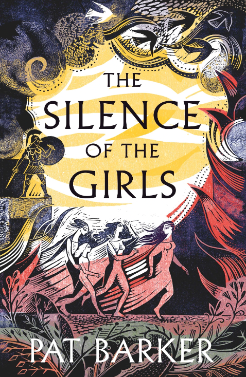Great Achilles. Brilliant Achilles, shining Achilles, godlike Achilles… How the epithets pile up. We never called him any of those things; we called him “the butcher.”
Swift-footed Achilles. Now there’s an interesting one. More than anything else, more than brilliance, more than greatness, his speed defined him. There’s a story that he once chased the god Apollo all over the plains of Troy. Cornered at last, Apollo is supposed to have said: “You can’t kill me, I’m immortal.” “Ah, yes,” Achilles replied. “But we both know if you weren’t immortal, you’d be dead.”
Nobody was ever allowed the last word; not even a god.
——————
I heard him before I saw him: his battle cry ringing round the walls of Lyrnessus.
We women—children too, of course—had been told to go to the citadel, taking a change of clothes and as much food and drink as we could carry. Like all respectable married women, I rarely left my house—though admittedly in my case the house was a palace—so to be walking down the street in broad daylight felt like a holiday. Almost. Under the laughter and cheering and shouted jokes, I think we were all afraid. I know I was. We all knew the men were being pushed back—the fighting that had once been on the beach and around the harbour was now directly under the gates. We could hear shouts, cries, the clash of swords on shields—and we knew what awaited us if the city fell. And yet the danger didn’t feel real—not to me at any rate, and I doubt if the others were any closer to grasping it. How was it possible for these high walls that had protected us all our lives to fall?
Down all the narrow lanes of the city, small groups of women carrying babies or holding children by the hand were converging on the main square. Fierce sunlight, a scouring wind and the citadel’s black shadow reaching out to take us in. Blinded for a moment, I stumbled, moving from bright light into the dark. The common women and slaves were herded together into the basement while members of royal and aristocratic families occupied the top floor. All the way up the twisting staircase we went, barely able to get a foothold on the narrow steps, round and round and round until at last we came out, abruptly, into a big, bare room. Arrows of light from the slit windows lay at intervals across the floor, leaving the corners of the room in shadow. Slowly, we looked around, selecting places to sit and spread our belongings and start trying to create some semblance of a home.
At first, it felt cool but then, as the sun rose higher, it became hot and stuffy. Airless. Within a few hours, the smells of sweaty bodies, of milk, baby-shit and menstrual blood, had become almost unbearable. Babies and toddlers grew fretful in the heat. Mothers laid the youngest children on sheets and fanned them while their older brothers and sisters ran around, overexcited, not really understanding what was going on. A couple of boys—ten or eleven years old, too young to fight—occupied the top of the stairs and pretended to drive back the invaders. The women kept looking at each other, dry-mouthed, not talking much, as outside the shouts and cries grew louder and a great hammering on the gates began. Again, and again, that battle cry rang out, as inhuman as the howling of a wolf. For once, women with sons envied those with daughters, because girls would be allowed to live.
